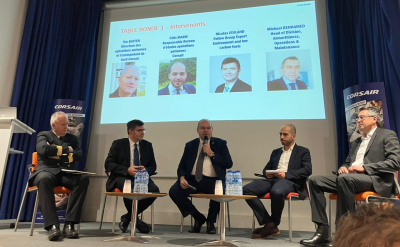News
A CALL FOR AN ENVIRONMENTALLY RESPONSIBLE AVIATION
We, alumni and students of ENAC (National University of Civil Aviation), are fully aware of the externalities of civil aviation, both positive and negative, that affect the environment and our society.
The value of air transportation to the world is undeniable. In many cases, no other mode of transportation can replace the unique type of mobility it provides.
Air transportation brings people together and promote fraternity, which are essential for maintaining world peace. It is a vector of cultural and economic development, and it promotes social and political integration as it facilitates connections between countries and regions, as well as their economies and populations.
Essential to the economy, employment, and tourism, air transportation is also a tool for the development and the accessibility of communities. Among other things, it maintains a link with overseas and landlocked territories.
Aircraft serves everyone, carrying out medical evacuations, delivering time-sensitive medical personnel and equipment as well as emergency supplies, and performing urgent and perilous rescue operations, both on a daily basis and during crises, especially when the ground infrastructure is unserviceable.
While we consider that air transportation will remain essential in this respect, we believe also that cooperation and partnerships between the various stakeholders of this sector, and beyond, will make it possible to find and implement relevant solutions to maintain and increase the efficiency of aviation. We pledge to contribute to this effort through our collective and individual activities.
Aviation still needs to optimize its environmental footprint.
Like the vast majority of human activities, aviation generates pollutions locally (noise, adverse impact on air quality, footprint of facilities, etc.) and contributes to climate change.
The aviation sector came to that realization as early as the 1970s and 1980s, when the first environmental standards were established by the International Civil Aviation Organization (ICAO), the United Nations agency dedicated to civil aviation.
Research programs have ever since identified technological improvements and clarified certain impacts(1). International norms and standards have made it possible to promote and support the implementation of technological improvements throughout the global aircraft fleet regarding noise(2), air quality(3), and greenhouse gas emissions(4). The aviation industry has been able to reduce its environmental impact, including on climate, thanks to these technological and operational innovations.
With a reduction of fuel consumption per passenger and per kilometer of about 80% over the last five decades, aviation currently contributes to 2% of anthropogenic CO2 emissions. According to the latest studies selected by the IPCC(5), if we take into account other emissions (NOx, water, etc.) and their potential warming effect, the overall impact of aviation is estimated to reach 3.5% of the global radiative forcing. However, the IPCC also mentions uncertainties on these figures(6).
Aviation was the first economic sector to create a worldwide carbon offsetting system(7). Also, aviation has voluntarily committed to "Net Zero Emission".
It must now accelerate the implementation of technological and operational improvements with disruptive solutions such as the expansion of the sustainable alternative fuel production, the optimization of airspace utilization, the design of new aircraft geometries, and the development of new propulsion systems based on electric, hybrid-electric, or hydrogen technologies.
The aviation industry must keep its commitment to achieve net zero emission, and it must reinvent itself to recover from an unprecedented health and economic crisis.
Fully engaged in addressing these issues – that can be divisive, we call for a balanced, fact-based, and quantified approach that would guide technological progress and practices towards an air transportation that reinvents itself with the shared goal of preserving Earth – our common home.
Consequently, we pledge to:
- Increase the environmental aspects of our scientific skills, from the time of our initial education and throughout our careers;
- Raise awareness on environmental issues within our organizations, education institutions, and to our colleagues;
- Promote the innovation capability of the aviation industry in order to keep attracting the best talents and ensure its sustainability;
- Guide our choices in our professional activities according to a balanced approach integrating environmental and sustainable development criteria;
- Develop and implement the best technologies and practices with regard to the environment, in our various fields;
- Promote the emergence of new sustainable air mobility, of all forms, in order to revive the unifying and innovative spirit of the aviation adventure of which France is the cradle – along with other nations, and to perpetuate its technological and operational excellence.
We want to work on further improving our knowledge and cooperate with scientific experts to reduce existing uncertainties. We want to research scalable and disruptive solutions that will help aviation meet present and future needs, and contribute to the United Nations’ Sustainable Development Goals (SDGs).
You can sign this manifesto in your personal space, or send an email (specifying your name / first name / surname / subscriber or non-subscriber status) to: contact@alumni.enac.fr
Signatories:
Marc HOUALLA (IENAC 82 / IAC 89) – President, ENAC Alumni & DGA-Director of Paris-CDG Airport, Groupe ADP
Frédéric FOUCHET (IENAC 93T) – VS1G Consulting
Julien ABIDHOUSSEN (EPL 09) – Air France pilot / Independent Strategy Consultant
Pierre ABRAHAM (IENAC 01T) – Director of Terminals T2ABCD, T1 & T3, Paris-Charles de Gaulle International Airport
Faude ADANHOUNSOUNOU (IENAC 05) – Vice-President, ENAC Alumni & Customer Services Engineer, Airbus
Maella ANDRE (MS MTA 12) – Project Manager, OSAC
Laure AZEMA (IENAC 06) – Airworthiness Referent, OSAC
Michaël BENHAMED (IENAC 94) – Head of division, Airworthiness, Operations & Maintenance, ENAC
Bastien BERNARD (ICNA 01A et MCTA 2016) – Director of Operations, Paris-Charles de Gaulle International Airport
Tanguy BERTOLUS (IENAC 93) – CEO, Lyon-St Exupéry Airport
Guillaume BLANDEL (ICNA 92/A) – Director of Operations, DNSA, DGAC (France)
Geoffroy BOUVET (EPL 79), President, APNA
Antony BRECK (MS MTA 10) – Director compliance, safety & security, French Bee
Julie CABANEL (IENAC 05-T) – Secretary, ENAC Alumni & Airports & Flight Ops Project Manager, CGX AERO
Olivier CHANSOU – Managing Director, ENAC
Patrick CIPRIANI (IAC 83) – Director of Civil Aviation Safety, DGAC (France)
Anne COTEL-BALLOT (IENAC 78T) – A.C.M.E. Audit Chairwoman
Maëlle COMBREAU (IENAC 19) – Former head of the solidarity office, BDE ENAC
Philippe CREBASSA (IAC 92) – Chairman of the Board, Toulouse-Blagnac International Airport
Marie-Claire DISSLER (IAC 90) – General Secretary, DGAC (France)
Elena DJAKOVITCH – ENAC Alumni Vice-President
Mehdi EL KOUCH (IENAC 06-T) – Vice-President, ENAC Alumni & Digital Services Marketing Manager, Airbus
Philippe FONTA (IENAC 87) – Senior sustainability expert founder and CEO, SCRUM-consult
Nicolas FOUQUET (IENAC 93) – General Directorate North Africa & Sahel, Air France
Arnaud FRANCQ (IEEAC 79) – Assistant Treasurer, ENAC Alumni
Damien GAUDIN (MS MTA 19) – Air France Executive, Member of the Supervisory Board
Gilles GOMPERTZ (IENAC 85) – Managing Director, AVICO
Florent GUILLERMET (IAC 95) – Director of Air Navigation Services (DSNA), Ministry of Ecological Transition (France)
Marc HAMY (IAC 83) – Vice-President corporate affairs, sustainability and environment, Airbus
Catherine JUDE (IAC 91)
Patrick KY (IAC 89) – Executive Director, EASA
Régis LACOTE (MS MA 97) – Global Chief Operating Officer, GMR Airports Limited
Stéphane LATIEULE (IEEAC I-86) – Execution Vice-President Aerospace & Defence, AKKA Technologies
Christophe LAURENT (MS MA 90) – Deputy Director of Paris-CDG International Airport
Gaël LE BRIS (IENAC 07T) – Head of International Development, ENAC Alumni & Senior Aviation Planner, Senior Technical Principal, WSP USA
Paul LEPAROUX (IENAC 67) – Retired DGAC, Treasurer, ENAC Alumni
Yannick MALINGE (IENAC 83) – Director of Flight Safety, Airbus
Isabelle MONNIER (IENAC 84) – Assistant Secretary, ENAC Alumni & Operational and strategic supervision, ENAC
André NZUZI (MS MA 12) – Administrator, ENAC Alumni & SMS Expert, Régie des Voies Aériennes de la RDC (RVA/RDC)
Amandine PATRUNO (MS MTA 10) – Head of the flight operations design office and flight preparation service, ASL Airlines France
Stéphanie POLTI (IENAC 01T) – Director of Air Operations, Air Calédonie International
Anne PRONOST (IEEAC 85) – Pilot Instructor 77, Inspector OCV, Air France
Jean-Marc de RAFFIN DOURNY (IENAC 66) – Administrator, ENAC Alumni & former CEO, OSAC
Antoine ROEHRI (IENAC 18 OPS) – Student, ENAC
Christelle SCHOEFFEL (IENAC 18 APPR) – Student, Co-Operative Master 2 of Public Policies: Consultation and Territory in Transition, ENAC
Nabil TAHIRI (IENAC 97T) – Administrator, ENAC Alumni & HO ATI Plannings & Operations Control Centrer, DTAVC, Airbus Transport International
ENAC Alumni is the association of all the alumni of ENAC. With over 26,750 members worldwide, the goal of the association is to organize this community through chapters all around the world, think thanks, Women of ENAC (Les Elles de l'ENAC), and above all its many volunteers who contribute effectively to the influence of the university.
ENAC, the National University of Civil Aviation, is a university of the French Civil Aviation Authority (DGAC), a directorate of the Ministry of Ecological Transition. It brings together educational and research activities in aeronautical engineering, air navigation, and piloting.
Each year, ENAC welcomes more than 2,000 students through more than 30 programs, as well as 3,500 professionals in continuing education.
As proof of its international influence, over 26,750 former students are based in more than a hundred countries on all five continents. Thanks to its size and its human and educational resources, ENAC is today the leading European aeronautical school.
Read more: www.enac.fr.
(1) Research programs including MOZAIC and IAGOS have shown that nitrogen oxide (NOx) emissions from subsonic air traffic do not contribute to the destruction of the ozone layer. However, at these altitudes, these emissions contribute to ozone formation and methane destruction.
(2) Noise: Aviation has reduced and continues to reduce its noise footprint through continuous technological improvements and increasingly stringent standards. Note (*): 34 EPNdB difference between the Chapter 2 standard established in 1972, and whose aircraft have been banned in Europe since 2000, and the latest Chapter 14 standard that all aircraft models must comply with since 2018. These standards are detailed in Volume I of ICAO Annex 16.
(3) Air quality: The aviation industry adopts high certification standards in terms of air quality, for certain pollutants such as nitrogen oxides (see Annex 16, Volume II, the first standard of which was established as early as 1981); it also adapts its operational practices locally (e.g., use of electric 400Hz power units instead of the APU).
(4) A certification standard for CO2 was also introduced in 2017, applicable starting 2020. It is the subject of Volume III of ICAO Annex 16.
(5) Source: Lee et al. ref. by the IPCC. https://doi.org/10.1016/j.atmosenv.2020.117834
(6) IPCC AR6 WGI, Chapter 7, August 07, 2021;
IPCC, 2021: Climate Change 2021: The Physical Science Basis. Contribution of Working Group I to the Sixth Assessment Report of the Intergovernmental Panel on Climate Change.
Chapter 7, Contrails and aviation-induced cirrus p45 section 7.3.4.2 “This assessment is given low confidence due to the potential for missing processes to affect the magnitude of contrails and aviation-induced cirrus ERF.”
https://www.ipcc.ch/report/ar6/wg1/downloads/report/IPCC_AR6_WGI_Chapter_07.pdf
(7) CORSIA (Carbon Offsetting and Reduction Scheme for International Aviation).
https://www.icao.int/environmental-protection/CORSIA/Pages/default.aspx
More information on CORSIA in Volume IV of ICAO Annex 16.
 19
19















No comment
Log in to post comment. Log in.